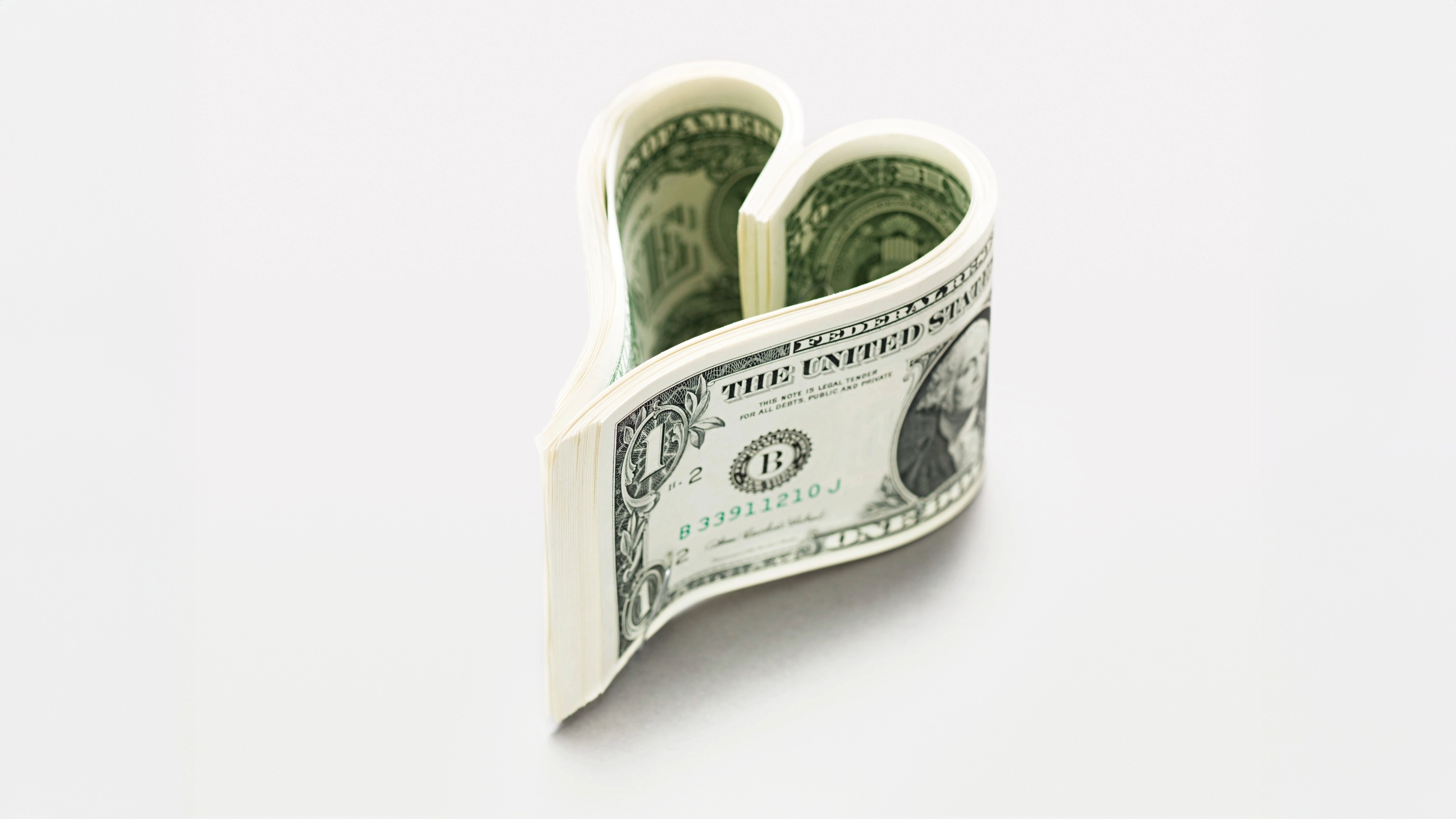How to Make the Most of Your Bonus (and Other Variable Income)
Putting your focus on meeting your savings goals first can set you up to use the rest of your bonus or other variable income however you’d like, without guilt or worry.

Profit and prosper with the best of Kiplinger's advice on investing, taxes, retirement, personal finance and much more. Delivered daily. Enter your email in the box and click Sign Me Up.
You are now subscribed
Your newsletter sign-up was successful
Want to add more newsletters?

Delivered daily
Kiplinger Today
Profit and prosper with the best of Kiplinger's advice on investing, taxes, retirement, personal finance and much more delivered daily. Smart money moves start here.

Sent five days a week
Kiplinger A Step Ahead
Get practical help to make better financial decisions in your everyday life, from spending to savings on top deals.

Delivered daily
Kiplinger Closing Bell
Get today's biggest financial and investing headlines delivered to your inbox every day the U.S. stock market is open.

Sent twice a week
Kiplinger Adviser Intel
Financial pros across the country share best practices and fresh tactics to preserve and grow your wealth.

Delivered weekly
Kiplinger Tax Tips
Trim your federal and state tax bills with practical tax-planning and tax-cutting strategies.

Sent twice a week
Kiplinger Retirement Tips
Your twice-a-week guide to planning and enjoying a financially secure and richly rewarding retirement

Sent bimonthly.
Kiplinger Adviser Angle
Insights for advisers, wealth managers and other financial professionals.

Sent twice a week
Kiplinger Investing Weekly
Your twice-a-week roundup of promising stocks, funds, companies and industries you should consider, ones you should avoid, and why.

Sent weekly for six weeks
Kiplinger Invest for Retirement
Your step-by-step six-part series on how to invest for retirement, from devising a successful strategy to exactly which investments to choose.
Variability in your cash flow can introduce some unique financial planning challenges, even for high-income earners. Managing money around an uneven distribution of pay is a learned skill, which is why more money really can lead to more problems.
Don't get stuck questioning how to organize your income or put your cash to best use. Here’s what you need to understand to make the most of your bonus money or other lump-sum payments.
How to manage cash flow around your bonus and variable income
People earn variable income or receive lump-sum payments from many different sources. Some might be unpredictable in total amount, but be on a known schedule. That might include bonus money, commissions, grants of equity compensation, business distributions, freelance income or tax refunds.
From just $107.88 $24.99 for Kiplinger Personal Finance
Become a smarter, better informed investor. Subscribe from just $107.88 $24.99, plus get up to 4 Special Issues

Sign up for Kiplinger’s Free Newsletters
Profit and prosper with the best of expert advice on investing, taxes, retirement, personal finance and more - straight to your e-mail.
Profit and prosper with the best of expert advice - straight to your e-mail.
Other sources of “variable income” might be more predictable in their sum, but completely unknown in regards to timing. Think inheritances, lottery winnings (while unusual, it does happen!) or net proceeds from large, planned sales of assets like a home.
Assuming you don’t have any urgent or emergency financial needs, put your focus on your savings goals when deciding how to use lump-sum payments. This approach sets you up to use the rest of that variable income money as you’d like, without guilt or worry.
Here’s how to do it:
- Know how much you need to save each year. At our planning firm, we recommend contributing at least 25% of gross income to long-term savings and investments. That can include money put into retirement plans, IRAs, brokerage accounts or HSAs.
- Prioritize that savings rate above all else when you can. This might not be realistic if you have pressing financial concerns or issues to address. But in general, save when you can if you receive a large lump-sum payment from a bonus or commission to reach your savings rate goal earlier in the year.
- Once you hit your savings rate goal, any other income or lump sums can then be used on what you want and what’s most important to you. That might mean funding other goals, like college education for a family member or enjoying an experience like international travel with your significant other.
By saving first, you also have a budget for your expenses built for you. It's a natural way to limit lifestyle inflation, which can be hard to manage through willpower alone.
Two methods for managing bonus money or other variable income streams
Specific cash-flow management methods tend to fall on a spectrum. At one end, keeping tight control over your cash flow can, from a numbers perspective, provide a greater chance of success with your overall financial plan. That’s because it means spending less and saving and investing more. The downside is that it can be limiting in the short-term.
At the other end, a more free-flowing approach allows room to "wing it." This can reduce stress in the present by avoiding feelings that you’re constantly nickel-and-diming yourself. It can also allow for more day-to-day flexibility. But you might not have as high of a savings rate as you could achieve. That, in turn, could push bigger goals and long-term plans out. It could even jeopardize your ability to reach them at all.
People tend to use systems at one end of the spectrum or the other. Here’s an example to see how this might work with some actual numbers. Let’s say we have a couple who make around $500,000 in total compensation through a combination of income sources:
- Regular, predictable salaries that add up to $300,000.
- A mix of bonus payments and grants of RSUs, or restricted stock units (which they sell upon vesting, generating a net cash profit), totaling around $200,000 each year.
Say this couple favor the “keep tight control of cash flow” philosophy that prioritizes saving as much as possible. They might take their base, salaried pay of $300,000 and do all their financial planning based on this number. They might set a savings rate target of 25%, contributing $75,000 to long-term investments. They’d then use the remaining $225,000, less taxes and benefits costs, as their annual budget. That would include things like their mortgage payment and other fixed costs. It would also account for any discretionary spending.
Any additional money from their variable income goes straight toward savings or investments. They might add to their long-term investment vehicles or fund other savings goals.
The benefit of this approach is an aggressive savings plan. That's great for accelerating progress toward goals like financial freedom. The downside is that you are not actually planning based on your real income. You may accidentally, artificially limit what's possible for yourself now and in the future. It also introduces a lot of manual decision-making into your life every time new bonus money or lump sums hit. That can leave you vulnerable to making mistakes or underfunding certain goals or priorities.
Now, let's look at what happens at the other end of the spectrum. We’d see this same couple earning the same money, but focusing on spending needs first. They’d assume their base pay of $300,000 (less taxes and benefits) was their budget for the year. They’d rely on their variable income throughout the year to save, invest and fund other goals and short- or long-term needs.
This can work, but it’s important to acknowledge the risk they take here. They leave their long-term savings more up to chance. If a bonus is not as expected, their savings will likely take the hit, as they already spent their expected income on your fixed costs.
As with most things, we think a middle-ground approach works best. Great cash-flow management often comes from making conservative assumptions about income. It also avoids wholly relying on an unpredictable bonus to take care of savings goals. You can also make realistic plan on reasonable expectations of what total gross income looks like, rather than pretending a bonus or other variable income isn't coming at all.
Two big mistakes to avoid when dealing with lump sums
The source of variable income shouldn’t necessarily change how you think about your money or your plans for it. But the reality is that managing this kind of cash flow comes with a psychological component. People tend to treat money differently based on where it came from.
If humans were perfectly rational, we would never do this. $1 is worth $1 whether it came from your paycheck, an unexpected bonus, a surprise inheritance or the sale of property. But many of us engage in mental accounting, despite how illogical it is, by elevating or discounting the worth of a dollar based on how we came to hold it.
Avoid treating bonus money or other lump sums as “free and clear” to spend. You still need to engage in responsible planning with this money, regardless of how you earned it. Instead of using the total for discretionary spending, you might break down a lump-sum payment into the following uses:
- Investing 50% of the total received.
- Allocating 30% to repaying debt.
- Using an additional 10% to fund a short-term goal.
- Spending the remaining 10% on whatever you’d like.
Keep in mind that the type of spending you do matters as well. There is a big difference between spending a lot of money one time and making a financial decision that locks a large, ongoing, fixed cost into your budget.
You don't want to lock a large, difficult-to-remove expense into your cash flow based on one particularly good income quarter or year. For example, you don’t want to take on a mortgage that would be impossible to pay with your base salary alone and hope that you continue earning aggressive bonuses to make up the difference.
We want to avoid planning based on highly optimistic numbers that may or may not continue into the future. That doesn’t mean default to the opposite and assume the worst. Great financial planning seeks out reasonable and realistic estimates to use based on what’s probable and then adds in layers of padding or buffer room to keep your finances safe and thriving over time.
Eric Roberge, CFP®, is the founder of Beyond Your Hammock, a virtual wealth management firm that provides planning strategies to professional couples in their 30s and 40s. To request a complimentary consultation and one-page financial plan, go to www.beyondyourhammock.com/schedule.
Profit and prosper with the best of Kiplinger's advice on investing, taxes, retirement, personal finance and much more. Delivered daily. Enter your email in the box and click Sign Me Up.

Eric Roberge, CFP®, is the founder of Beyond Your Hammock, a financial planning firm working in Boston, Massachusetts and virtually across the country. BYH specializes in helping professionals in their 30s and 40s use their money as a tool to enjoy life today while planning responsibly for tomorrow.
Eric has been named one of Investopedia's Top 100 most influential financial advisers since 2017 and is a member of Investment News' 40 Under 40 class of 2016 and Think Advisor's Luminaries class of 2021.
-
 AI Unwind Takes 2% Off the Nasdaq: Stock Market Today
AI Unwind Takes 2% Off the Nasdaq: Stock Market TodayMarkets are paying more and more attention to hyperscalers' plans to spend more and more money on artificial intelligence.
-
 Big Change Coming to the Federal Reserve
Big Change Coming to the Federal ReserveThe Lette A new chairman of the Federal Reserve has been named. What will this mean for the economy?
-
 A Scary Emerging AI Threat
A Scary Emerging AI ThreatThe Kiplinger Letter An emerging public health issue caused by artificial intelligence poses a new national security threat. Expect AI-induced psychosis to gain far more attention.
-
 These Thoughtful Retirement Planning Steps Help Protect the Life You Want in Retirement
These Thoughtful Retirement Planning Steps Help Protect the Life You Want in RetirementThis kind of planning focuses on the intentional design of your estate, philanthropy and long-term care protection.
-
 Fixed Indexed Annuities and Bonds: The Perfect Match as Interest Rates Inch Lower?
Fixed Indexed Annuities and Bonds: The Perfect Match as Interest Rates Inch Lower?The prospect of more interest rate cuts has investors wondering how to enhance the bond portion of their portfolio. A fixed indexed annuity could be the answer.
-
 'Fee-Only' and 'Fiduciary' Are Not the Same: A Financial Pro Sets the Record Straight
'Fee-Only' and 'Fiduciary' Are Not the Same: A Financial Pro Sets the Record StraightThe terms fiduciary and fee-only are not interchangeable. Knowing the difference ensures investors get the advice and the consumer protection they need.
-
 I'm a Financial Adviser: This Is Why a Second (Gray) Divorce Could Cost You Big-Time
I'm a Financial Adviser: This Is Why a Second (Gray) Divorce Could Cost You Big-TimeDivorce isn't any easier the second time, especially if you've remarried later in life. Rushing to settle without proper advice can have serious consequences.
-
 A Matter of Trustees: Is Your Spouse the Best Person to Manage the Kids' Trusts?
A Matter of Trustees: Is Your Spouse the Best Person to Manage the Kids' Trusts?Naming your spouse as trustee can provide invaluable familial insight and continuity, but you should carefully weigh those benefits against potential risks.
-
 Passive Muni Investors: Is Your Strategy Missing the Mark?
Passive Muni Investors: Is Your Strategy Missing the Mark?Passive investments in municipal bonds are popular, but do they come at a cost? Two recent examples show why an active approach can be more favorable.
-
 Tied Up in Knots Over a Concentrated Stock Position? This Strategy Will Help You Unravel
Tied Up in Knots Over a Concentrated Stock Position? This Strategy Will Help You UnravelIf you've built significant wealth through stock in one company, deciding your next move may be petrifying. Use this decision-making framework to get unstuck.
-
 How to Put Your IRA to Work for Change and to Help the Next Generation, Courtesy of an Investment Adviser
How to Put Your IRA to Work for Change and to Help the Next Generation, Courtesy of an Investment AdviserUnhappy with the environmental and social impact of your investments? An impact fund that aligns your portfolio with your values could make all the difference.
